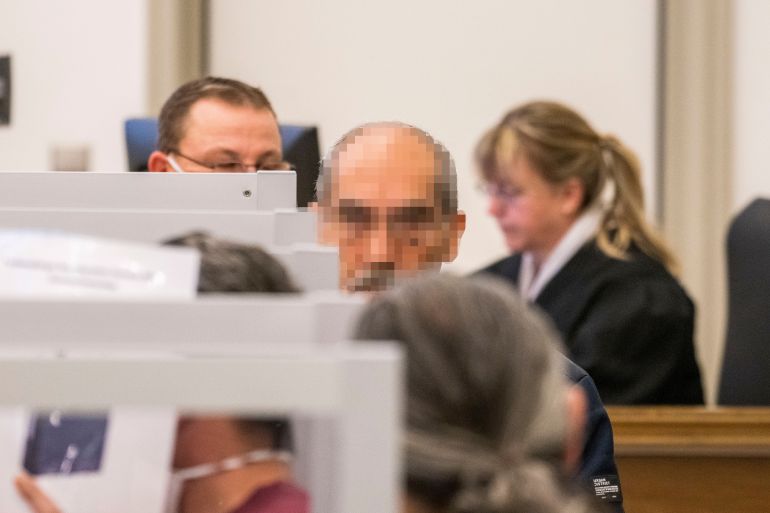Relief, satisfaction at conviction of Syrian former colonel
Survivor Musallam al-Quwatli says conviction of Anwar Raslan for his role in crimes against humanity was a ‘first step’.

Koblenz, Germany – The final day of the world’s first criminal trial focused on war crimes in Syria started long before dawn. A small crowd began to gather at the doors of the courthouse in the southwestern German city of Koblenz at about 3am, eager to secure their seats inside.
When Merlina Herbach and Hassan Kansour arrived at 4:30am (03:30 GMT), it was still dark outside.
Keep reading
list of 3 itemsGerman court sentences former Syrian colonel to life in prison
The Trial of Anwar Raslan
“We’ve been at the trial every single session for the past two years,” Herbach explained. The pair are trial observers for the Syria Justice and Accountability Centre. “We didn’t want to miss out on a seat.”
In 2019 German federal prosecutors accused a former Syrian colonel, Anwar Raslan, of complicity in crimes against humanity. To do so, they used a principle called universal jurisdiction that allows countries such as Germany to prosecute war crimes wherever they are committed.
Before he defected in 2012 and sought asylum in Germany, Raslan had been in charge of an office of Syria’s notoriously brutal secret service, Branch 251, in Damascus. As such, the prosecutors said he was complicit in torture, murder and sexual assault.
He is the highest-ranking official to stand trial for atrocities committed in Syria.
Raslan’s trial started in April 2020 and this Thursday – 21 months, 108 hearings and more than 80 witnesses later – it came to an end.
By the time the sun started to rise, approximately 50 people, many of them Syrians, were standing in line, waiting to enter the courtroom. Women from the Syria Campaign, an advocacy group, held up pictures of loved ones still missing back home and staged a small sit-in, in the cold. About a dozen camera crews filmed the queue and the protesters.
“I was a bit worried when I first arrived,” one of the members of the sit-in mused. “What if something disappointing happens? How will that feel for all of us, inside and outside Syria?”
When the court session commenced at about 10:30am (9:30 GMT), the court was packed. All 36 seats in the gallery, separated by clear plastic screens because of the pandemic, were filled by members of the public and journalists. Approximately a dozen Syrian co-plaintiffs and their lawyers were also present.
Judge Anne Kerber, the head of the panel of five judges who heard the case, promptly announced that Raslan would be given a life sentence. The judge then spent the next six hours explaining the reasoning behind the sentencing, with two translators repeating everything in Arabic.
Raslan was “a careerist in a totalitarian regime”, Kerber said. “But he was not just a small cog in the regime’s apparatus.”
He knew what was going on in that prison and he accepted it, Kerber told the court.
As a result, the judges at the Higher Regional Court found the Syrian man guilty of being an accomplice of the Syrian government in the murder of 27 people and the torture of 4,000 more, as well as various counts of sexual and physical violence and unlawful detention.
However, they did not find him guilty “under exceptional circumstances”, which would have meant no chance of parole.
“The crimes happened a long time ago and he has not committed any crimes since then,” Judge Kerber explained. “He did help some individuals [get out of the prison] and treated some others well.”
‘A first step’
The mood in the courtroom after the sentencing was one of relief rather than joy.
“I’ve worked on this for two years and I am just relieved,” said Joumana Seif, a research fellow at the European Center for Constitutional and Human Rights, which supported several of the torture survivors in the case. “Especially when I saw the survivors were satisfied. It is legal recognition of their pain and suffering.”
“It’s a first step and something we can build on in the future,” said Musallam al-Quwatli, a survivor who still suffers psychological issues after being tortured at Branch 251 in 2011
At a brief outdoor news conference after the court case ended, the lawyers who had assisted the survivors also pronounced themselves satisfied while stressing the need for more cases like this. Raslan’s lawyers immediately launched an appeal, as had been expected.
“I felt it was fair. It restored my faith in justice,” Rowaida Kanaan, a journalist who was jailed five times in Syria and a co-plaintiff in the case, said.
Kannan said she had hoped to see some reaction from Raslan himself. Throughout the trial, the slight, balding and moustachioed former commander has mostly been implacable, hunched into his khaki jacket, taking notes for himself and even occasionally closing his eyes. He barely looked around.
“When the judge told him he was responsible for 27 murders, there was nothing. No reaction,” Kanaan recounted. “It’s almost like he was still in the same place, back in Branch 251, writing notes.”